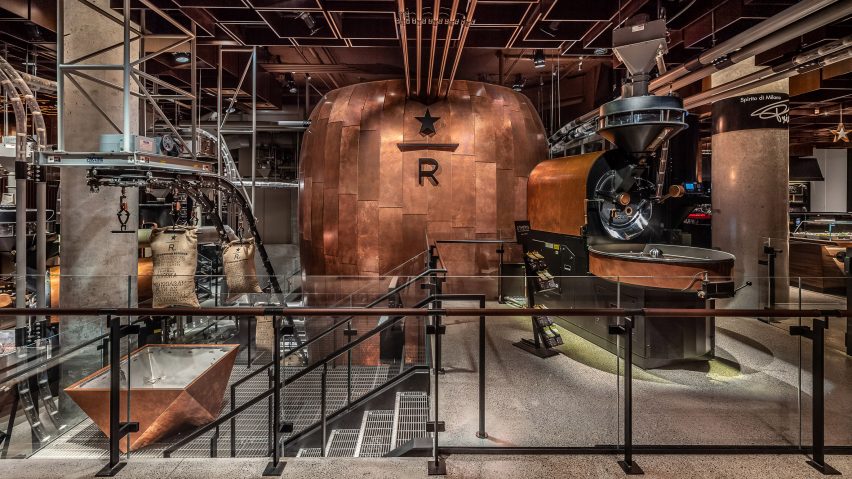Starbucks has unveiled a sprawling outpost "inspired by the history of manufacturing" in Manhattan's Meatpacking District, with copper pipes overhead that move coffee beans around the site.
Starbucks Reserve Roastery is an expansive three-level concept space designed in-house by Liz Muller, chief design officer and senior vice president of Starbucks, and her team.
Measuring nearly 23,000 square feet (2,137 square metres), the site includes various seating and retail areas, two coffee counters, a Milanese Princi bakery, a subterranean warehouse, and a craft cocktail bar Arriviamo on its mezzanine.
The roastery occupies the ground floor of a new, corner office building by Uruguayan architect Rafael Viñoly that spans nine storeys.
The interiors are "inspired by the history of manufacturing in the neighbourhood" and are notable for their dark materiality, with concrete floors, wood furnishings and copper accents. Thousands of square and rectangle shapes covers the ceilings, laced with copper lighting and acoustic features.
"The really striking quality of the building itself is that it's made up of these beautiful, rigid squares and rectangles, pushed and pulled," said Jill Enomoto, a design director at Starbucks. "We fell in love with the geometry of the building and riffed off that idea."
Also across the ceiling is a network of twisting pipes, which carry freshly roasted beans to silos at various coffee counters. This feature showcases the project's main function: to roast the Starbucks' Reserve blends. The Seattle-based company plans to roast 1.5 million pounds of Reserve coffee at the space in the first year, with 20 different types of beans and help from 280 employees.
Inside, an open layout offers 360-degree views across all of the various sitting areas. At the heart is a 30-foot-tall (nine-metre), oval-shaped copper cask marked with an R logo. This cask holds freshly roasted coffee that needs to rest before use in beverages, and was fabricated and installed by Kansas City architecture firm A Zahner.
"The Roastery is a thoughtfully designed workspace where every day we are roasting small-lot, single-origin Reserve coffee and blends," said a statement from Starbucks.
Filling the space are hundreds of custom-made walnut chairs by Bassamfellows, accompaning numerous side tables and a wood-burning fireplace. Lamp designs are hand-folded metal by Studio Snowpuppe and Marc de Groot.
"It's beautiful furniture with a classic yet modern American style – and also sturdy," Muller said. "The furniture has to look great but also perform like a truck. It's perfect for this location, which I know will be busy."
Also inside are various counters for buying foods like pizzas, cakes and pastries, alongside coffee and other drinks. Upstairs features a 60-foot (18-metre) mixology bar on the mezzanine, with a railing to overlook the main areas.
Completing the project is a terrarium by Baltimore company Furbish, with coffee plants, ferns and philodendrons commonly found in Costa Rica. The display shows customers the lifecycle of coffee beans, and includes a window into the room that stores green coffee beans before they are roasted.
The Starbucks Reserve Roastery also doubles as a co-working space, which is open to the public, and can be booked for private events – similar to the A/D/O creative space in Brooklyn.
"You can have a party here. You can meet your love here," said Muller of the roastery. "You can come here on your own. You can come here when you're visiting the neighbourhood. You could come here as your daily ritual."
"I think this does a little bit of all of that, and it is very much New York," she added.
This is Starbucks' fourth Roastery outpost, following Seattle, Shanghai and Milan, with two more planned for Tokyo and Chicago this year. All Starbucks Reserve coffee is roasted at these sites.
Other Starbucks locations with unusual design features include a shipping container in Taiwan by Kengo Kuma, and a pop-up coffee shop in Tokyo by Nendo, where customers order drinks by taking books to a counter.
Photography is by Matt Glac.

